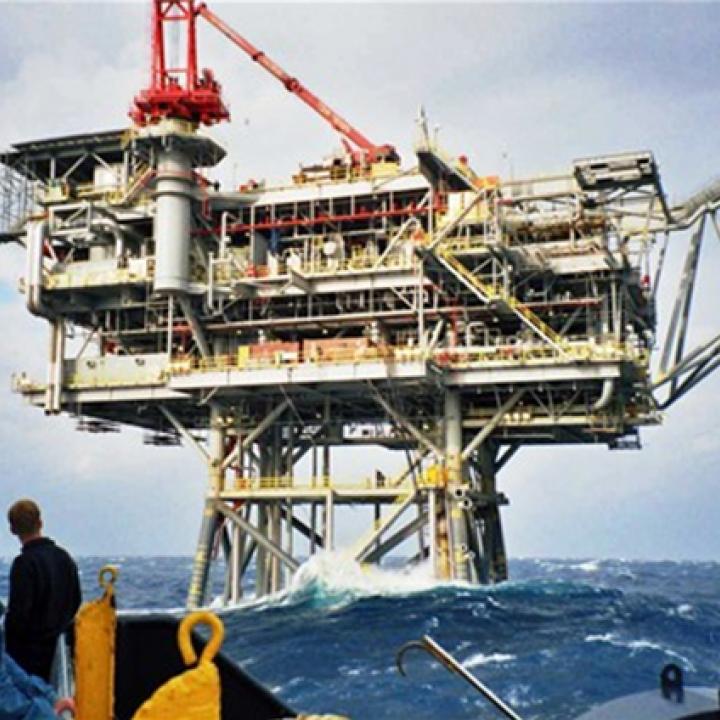
- Policy Analysis
- Policy Alert
Israel’s Offshore Gas Attracts Foreign Energy Giants

A joint BP/UAE takeover bid for Israel’s NewMed Energy reflects increasing demand for East Mediterranean gas and confidence that there is more to be found.
The renewed luster of investing in the East Mediterranean’s offshore energy resources is perhaps best summed up in a recent comment by Chevron CEO Mike Wirth, who told investors last month, “It’s a beautiful asset.” This week, Chevron’s rivals BP and the Abu Dhabi National Oil Company (ADNOC) made a bid to acquire 50 percent of the Israeli firm NewMed Energy, but Wirth’s company will be closely involved if the deal goes through.
In 2020, Chevron purchased Houston-based Noble Energy, thereby acquiring a stake in Israel’s Leviathan natural gas field. NewMed Energy (formerly Delek Drilling) owns 45.3 percent of this field—the largest stake—while Chevron’s stake became 39.7 percent when it took over as operator.
When it first bought Noble, Chevron is believed to have received a discreet message of “no objection” from both Saudi Arabia and the United Arab Emirates, ADNOC’s owner. Along with BP and other majors, Chevron had historically avoided doing business with Israel for fear of jeopardizing its activities in the Arab world. In the years since the Noble purchase, however, Gulf Arab states have been doing such business themselves—the UAE sovereign investment fund Mubadala took a 22 percent stake in Tamar, Israel’s other major offshore gas field, while Israel’s links with Saudi Arabia have increased as well (though they have yet to become official and open).
If the NewMed bid goes through, BP will bring its enormous exploration experience to the East Mediterranean, which is thought to have more reserves waiting to be discovered. BP recently reduced climate targets and announced a fresh emphasis on oil and gas. Abu Dhabi has some of the largest oil reserves in the world and is expanding production of gas, of which it has several times the reserves held by Egypt and many multiples more than Israel’s discoveries.
Talks about a deal have been ongoing for months. According to Bloomberg, the bid’s announcement was threatened with delay because of Israel’s political crisis, “but the companies decided to push ahead.” The bid valued NewMed shares at 12.05 shekels; the closing price the day before the announcement was 7 shekels.
Meanwhile, the Leviathan partners announced earlier this month that they would be boosting production and exports by 2025, in part by laying a third subsea pipeline from the field (located eighty miles west of Haifa) to the production platform where the gas is processed (a few miles off Israel’s coast). Some of this gas will be exported to Jordan and Egypt, and some will be used domestically in Israel. The longer-term plan is to almost double Leviathan’s volume by the end of the decade.
Increased Israeli exports are currently hampered by the fact that Egypt only uses Israeli gas domestically rather than re-exporting it abroad. Cairo prefers to liquefy Egyptian-produced surplus gas for export via tankers, since such shipments have attracted premium prices during the Ukraine crisis. The Leviathan partners have been debating how to circumvent this bottleneck. One idea is to invest in an expensive floating liquefaction vessel moored off Israel’s coast, which could then load LNG onto tankers for export anywhere in the world. An alternative is to build a subsea pipeline to Europe; the Italian energy group Edison stated last week that it would make a final investment decision on such a project by year’s end, though the U.S. government has repeatedly cast doubt on its viability.
While the BP/ADNOC bid for NewMed suggests confidence in the area’s energy future, policymakers and other observers should keep in mind that energy projects—especially expensive, deep-sea ones—have a typical investment horizon of twenty years ahead. Anticipating demand that far into the future is a challenge. Indeed, before the Ukraine crisis, many were skeptical about the role of gas on the global energy supply spectrum even ten years ahead. That timeline has now been reassessed, but demand will inevitably remain a hostage to political and economic fortunes. Such uncertainties and challenges illustrate why energy companies like BP and ADNOC tend to share the risk—and why Israel’s government should be cautious with its investment laws.
Simon Henderson is the Baker Fellow and director of the Bernstein Program on Gulf and Energy Policy at The Washington Institute.



